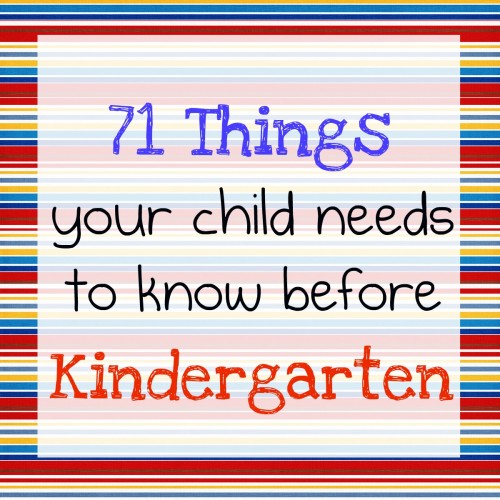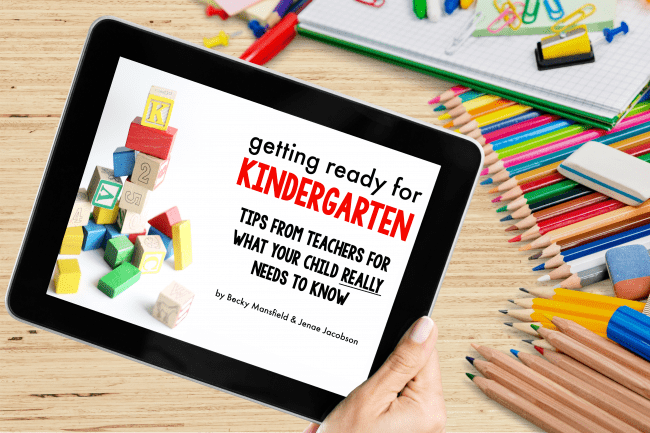What Should a Four Year Old Know Academically
Wondering what your child needs to know before starting school? This list includes 71 things your child needs to know before kindergarten!


What a Child Needs to Know Before Kindergarten
Here is a list of kindergarten readiness skills based loosely upon a preschool inventory given to children at the very end of our local Pre-Kindergarten program. It was used as both a guiding document as well as an assessment at the end of the year. The original list includes 71very specificobjectives, but I have tried to narrow it down
Please keep in mind as you look over this list that kids learn best with hands-on experiences,not memorization or drill practice! These early years with our children should be about fostering a love to play, explore, and learn! Also, it is important to note that our children are all different and gifted in unique ways. Obviously, if your child has special needs, exceptionalism, or is delayed in a particular area, this won't necessarily be relevant to your child. This is simply a guide…not something to stress about!
Finally, all areas of development are of equal importance to young children! Gross motor and social development tasks are just as important as cognitive and pre-reading tasks at this age. Also, it is important to note that there is no prerequisite (besides age) for children to go to public schools here in the United States. Although it would be ideal for each child to come into kindergarten already mastering these skills, this is obviously not the reality for many children. Schools are prepared to meet the needs of individual students, regardless of their current ability.
Have fun learning together through games and various experiences while still encouraging your child's natural creativity!
What does your child really need to know before kindergarten?!?!
Despite the fact that I am sharing this exhaustive list, the two MOST IMPORTANT skills for your child before he/she begins kindergarten is a desire to learn and a respect for others. Obviously, these "skills" are also the most difficult to quantify or measure. But if you are raising your child to be curious and inquisitive of the world around him while also teaching him to obey authority and treat other children with kindness, the rest of this list is just a bonus!
Kindergarten Readiness: Personal and Social Development
Learning
- Shows an eagerness to learn and age-appropriate curiosity
- Persists in completing a task and is willing to ask for help if needed
- Exemplifies a pleasant and cooperative personality
Self-Control
- Follows rules and routines
- Manages transitions (going from one activity to the next)
- Demonstrates normal activity level
Interactions with Others
- Interacts easily with one or more children
- Interacts easily with familiar adults
- Participates in group activities
- Plays well with others
- Takes turns and shares
- Cleans up after play
Conflict Resolution
- Seeks adult help when needed to resolve conflicts
- Uses words to resolve conflicts
Kindergarten Readiness: Language and Literacy
Listening
- Listens attentively to directions and conversations
- Follows one and two-step directions
Speaking
- Speaks clearly and can be easily understood without the need for contextual clues
- Can sequence events in an oral conversation
Literature and Reading
- Listens with interest to stories read aloud
- Shows interest in reading-related activities
- Retells information from a story
Writing
- Uses pictures to communicate ideas
- Scribbles, draws shapes, or attempts to create letter-like symbols to write words or ideas
Alphabet Knowledge
- Recites/sings alphabet
- Identifies upper-case letters
- Identifies lower-case letters
- Matches upper-case letters to the lower-case letter counterpart
Kindergarten Readiness: Mathematical Thinking
Patterns and Relationships
- Sorts by color, shape, and size
- Orders or seriates several objects on the basis of one attribute (i.e. "size"– small, medium, large)
- Recognizes simple patterns and duplicates them (i.e. circle, square, circle, square)
Number concept and operations
- Rote counts to 20
- Demonstrates one-to-one correspondence when counting 10 objects
- Matches oral numbers to their written numerals
- Identifies numerals 0-10
Geometry and spatial relations
- Identifies 4 shapes- circle, square, rectangle, triangle
- Demonstrates concepts of positional/directional concepts (up/down, over/under, in/out, behind/in front of, beside/between, top/bottom, inside/outside, above/below, high/low, right/left, off/on, first/last, far/near, go/stop).
Measurement
- Shows understanding of and uses comparative words (big/little, large/small, short/long, tall/short, slow/fast, few/many, empty/full, less/more).
Kindergarten Readiness: Physical Development
Gross-Motor Skills
- Pedals and steers a tricycle
- Jumps in place, landing on two feet
- Jumps consecutively- 7 jumps
- Balances on one foot for 5 seconds
- Hops on one foot 2-3 hops
- Hops on one foot- 6 ft.
- Throws a ball with direction- 5 ft.
- Catches a thrown ball with arms and body
- Climbs a playground ladder
- Skips smoothly for 20 feet
Fine-Motor Skills
- Stacks 10 small blocks
- Strings large beads
- Completes a seven-piece interlocking puzzle
- Makes a pancake, snake, and ball from playdough
- Grasps pencil correctly (i.e. proper pencil grip)
- Copies: vertical line, horizontal line, circle, cross, square, V, triangle
- Prints first name
- Grasps scissors correctly
- Cuts within 1/4″ of a straight line
- Cuts out a small square, triangle, and circle
- Uses a glue stick appropriately
- Uses appropriate amount of glue for tasks
Kindergarten Readiness: The Arts
Creative Arts
- Identifies 10 colors: red, yellow, blue, green, orange, purple, black, white, brown, pink
- Uses a variety of art materials for tactile experience and exploration (paint, crayons, markers, clay, etc)
- Enjoys singing
- Dances like no one is watching :)
- Makes believe with objects
- Takes on pretend roles and situations
Remember parents, this list is just a guide.
If you're looking for some suggestions on practical things you can do to prepare your child for Kindergarten, check out 33 Ways to Prepare Your Child for Kindergarten.
You can download and print a list with simple, easy activities that will help to ensure your child is ready!
If this feels overwhelming…
Getting ready for Kindergarten is a simple resource that will show you step by step how to have your child kindergarten ready, whether you are a first time parent, a carer or home school.
Click on the pic below to get your copy now…

This article was first published March 2012. Updated 2019.
What Should a Four Year Old Know Academically
Source: https://www.icanteachmychild.com/71-things-your-child-needs-to-know-before-kindergarten/
0 Response to "What Should a Four Year Old Know Academically"
Post a Comment